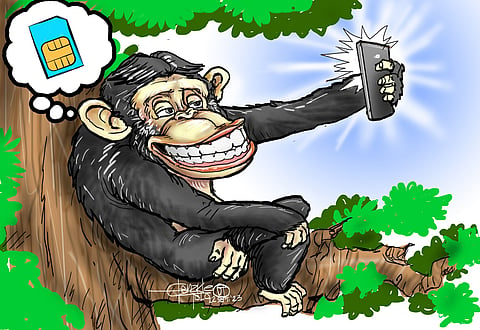
- NEWS
- the EDIT
- COMMENTARY
- BUSINESS
- LIFE
- SHOW
- ACTION
- GLOBAL GOALS
- SNAPS
- DYARYO TIRADA
- MORE

Okay, the cat, or rather, the monkey, is out of the bag. This was after the National Bureau of Investigation regaled the Senate with a demonstration of how it was able to register a SIM, or subscriber identity module, using a fake PhilHealth identification card bearing the mug of a smiling primate.
It was a situation so ludicrous if not for the serious implications it poses for the country's fight against smartphone-wielding scammers who have made a mockery of the SIM Registration Law mandating the registration of all SIM cards.
One senator described the NBI test, done in the same manner that so-called white hackers test vulnerabilities or points of entry of security systems, as an "insult" to the law. Who can argue with that assessment when faced with a simian selfie submission?
The absurdity of a monkey registering a SIM card is amusing, but the underlying issue is not. Innumerable people have suffered financial losses and emotional distress as a result of con artists running amok in the Philippines.
With much fanfare, the SIM Registration Act was enacted to combat these illegal activities, but it appears to be failing in the face of evolving scams and tenacious wrongdoers. There are calls to improve the law's implementing rules and regulations, but even that may prove to be just a palliative measure at best.
Blame-laying quickly reared its ugly head in the Senate when the telcos were faulted for allegedly opposing the inclusion of facial recognition technology in registering SIM cards. Such a system would have exposed the NBI's monkey business, but against pictures of random people taken off the net?
Facial recognition, insofar as ensuring that real people are registering SIM cards, may not be the silver bullet it is being touted to be. Despite having been available for decades, the technology has yet to mature to a level that could assure full confidence that it would work not just most of the time but all of the time.
One particular telco was quick to point out that the SIM Registration Law would have lived up to its promise had the government fully implemented the national ID system, thus enabling telcos to access the biometric database of registrants.
While the NBI added a surreal twist to the discussion, at the heart of the problem is clearly the inadequate verification of subscriber identities during SIM registration, something that scammers have taken advantage of.
Getting their share of the flak were over-the-top messaging services like Viber, Facebook Messenger, and WhatsApp, which the telcos claimed had not weeded out accounts with deactivated SIM cards as long as they were registered with the digital messaging applications before the deadline for registering SIMs.
For online payment apps such as GCash and Maya, the proliferation of SIM cards whose owners had run rings around the SIM Registration Law is a cause for grave concern for their digital wallet users.
To a cyber security expert, the solution may be to simply link the telcos' systems with a government-operated integrated database so they could post-validate the IDs submitted by users. This would help counter the use of fake IDs during the registration process, he said.
There has also been a call for stiffer penalties against those selling pre-registered SIM cards that are being used for fraudulent activities. Alongside these technical measures, it is crucial to educate the public on the risks of text scams and how people can protect themselves. Awareness campaigns can empower individuals to recognize and report scams, reducing the success rate of fraudsters.
As scammers frequently use digital messaging services, it is critical to work with these platforms to implement stricter verification processes. This could include mandatory identity verification for users. Similarly, telcos should conduct regular audits of their SIM registration processes to identify and correct flaws. In the ever-changing landscape of cybercrime, an ongoing commitment to security is essential.
While the idea of a monkey registering a SIM card may evoke laughter, it serves as a stark reminder of the challenges posed by scammers in the digital age.
The SIM Registration Act could still serve as a valuable tool in the fight against text scams and other criminal activities, but it must be bolstered with effective measures and a commitment from all stakeholders, including telecommunications companies and digital messaging services.
Against scammers, we cannot have monkeys that see no evil, hear no evil, and speak no evil. It's enough that one smiling monkey recently achieved what many frustrated humans struggle with daily: Registering a SIM card in the Philippines.
